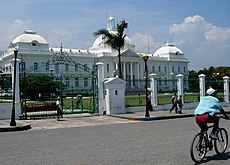
United Nations Security Council resolution 940, adopted on 31 July 1994, after recalling resolutions 841 (1993), 861 (1993), 862 (1993), 867 (1993), 873 (1993), 875 (1993), 905 (1994), 917 (1994) and 933 (1994), the Council permitted a United States-led force to restore President Jean-Bertrand Aristide and authorities of the Government of Haiti, and extended the mandate of the United Nations Mission in Haiti (UNMIH) for an additional six months.
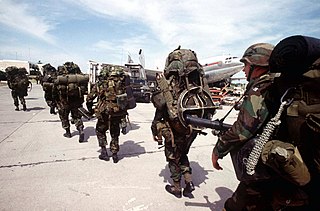
Operation Uphold Democracy was a multinational military intervention designed to remove the military regime led and installed by Raoul Cédras after the 1991 Haitian coup d'état overthrew the elected President Jean-Bertrand Aristide. The operation was effectively authorized by the 31 July 1994 United Nations Security Council Resolution 940.
The United Nations Mission in Haiti (UNMIH) was a peacekeeping operation carried out by the United Nations between September 1993 and June 1996. The Mission was reestablished (MINUSTAH) in April 2004, after a rebellion took over most of Haiti and President Bertrand Aristide resigned. This mandate ended in 2017, replaced by United Nations Mission for Justice Support in Haiti (MINUJUSTH), which saw the end of UN peacekeepers in Haiti after its ending in 2019.

United Nations Security Council resolution 820, adopted on 17 April 1993, after reaffirming all previous resolutions on the topic for a lasting peace settlement in Bosnia and Herzegovina and the region, the council discussed the peace plan for Bosnia and Herzegovina and comprehensive steps to ensure its implementation.
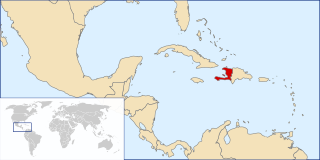
United Nations Security Council Resolution 841, adopted unanimously on 16 June 1993, after recognising the need for an urgent settlement to the situation in Haiti and the efforts of the Secretary-General of the United Nations Boutros Boutros-Ghali and the Secretary General of the Organization of American States João Clemente Baena Soares, the Council placed various international sanctions on Haiti.
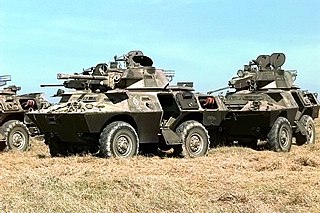
United Nations Security Council resolution 861, adopted unanimously on 27 August 1993, after recalling Resolution 841 (1993) and welcoming an agreement between the President of Haiti and the commander-in-chief of the Armed Forces of Haiti, the council, acting under Chapter VII of the United Nations Charter, suspended international sanctions against Haiti.

United Nations Security Council resolution 862, adopted unanimously on 31 August 1993, after recalling resolutions 841 (1993), 861 (1993) and an agreement between the President of Haiti and the Commander-in-Chief of the Armed Forces of Haiti, the Council reaffirmed the international community's commitment to a solution in Haiti and discussed the establishment of a new police force in Haiti under a proposed United Nations Mission in Haiti (UNMIH).

United Nations Security Council resolution 864, adopted unanimously on 15 September 1993, after reaffirming resolutions 696 (1991), 747 (1992), 785 (1992), 793 (1992), 804 (1993), 811 (1993), 823 (1993), 834 (1993) and 851 (1993), the Council noted the continuing situation in Angola and went on to condemn and place international sanctions on UNITA.
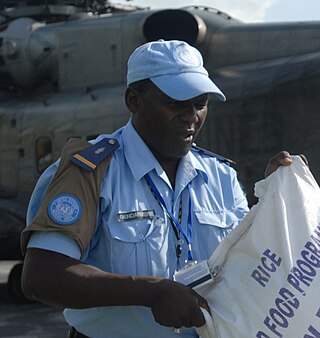
United Nations Security Council resolution 867, adopted unanimously on 23 September 1993, after recalling resolutions 841 (1993), 861 (1993) and 862 (1993) on the situation in Haiti, the council reiterated its position of protecting international peace and stability and established the United Nations Mission in Haiti (UNMIH).

United Nations Security Council resolution 873, adopted unanimously on 13 October 1993, after recalling resolutions 841 (1993), 861 (1993), 862 (1993) and 867 (1993), the council noted the continued obstruction of the arrival of the United Nations Mission in Haiti (UNMIH) and the failure of the Armed Forces of Haiti to carry out their responsibilities and therefore reimposed international sanctions against Haiti that were previously suspended.

United Nations Security Council resolution 875, adopted unanimously on 16 October 1993, after recalling resolutions 841 (1993), 861 (1993), 862 (1993), 867 (1993) and 873 (1993), the council, aware of the continued failure of parties in Haiti implement the Governors Island Agreement, widened international sanctions and imposed a naval blockade against the country.

UN Security Council Resolution 883, adopted on 11 November 1993, after reaffirming resolutions 731 (1992) and 748 (1992), the council noted that, twenty months later, Libya had not complied with previous Security Council resolutions and as a consequence imposed further international sanctions on the country.

United Nations Security Council resolution 905, adopted unanimously on 23 March 1994, after recalling resolutions 841 (1993), 861 (1993), 862 (1993), 867 (1993), 873 (1993) and 875 (1993), on the situation in Haiti, the council extended the mandate of the United Nations Mission in Haiti (UNMIH) until 30 June 1994.

United Nations Security Council resolution 933, adopted unanimously on 30 June 1994, after recalling resolutions 841 (1993), 861 (1993), 862 (1993), 867 (1993), 873 (1993), 875 (1993), 905 (1994) and 917 (1994), the Council noted the deteriorating situation in Haiti and extended the mandate of the United Nations Mission in Haiti (UNMIH) until 31 July 1994.

United Nations Security Council Resolution 944, adopted on 29 September 1994, after recalling resolutions 841 (1993), 861 (1993), 862 (1993), 867 (1993), 873 (1993), 875 (1993), 905 (1994), 917 (1994), 933 (1994) and 940 (1994), the Council affirmed its willingness to suspend sanctions against Haiti once the legitimate President Jean-Bertrand Aristide had returned following the removal of the military junta.

United Nations Security Council resolution 948, adopted on 15 October 1994, after recalling resolutions 841 (1993), 861 (1993), 862 (1993), 867 (1993), 873 (1993), 875 (1993), 905 (1994), 917 (1994), 933 (1994), 940 (1994) and 944 (1994), the Council welcomed the return of the legitimate President of Haiti Jean-Bertrand Aristide and lifted sanctions imposed on the country.

United Nations Security Council resolution 964, adopted on 29 November 1994, after recalling resolutions 841 (1993), 861 (1993), 862 (1993), 867 (1993), 873 (1993), 875 (1993), 905 (1994), 917 (1994), 933 (1994), 940 (1994), 944 (1994) and 948 (1994), the council noted the progress in Haiti and strengthened the advance team of the United Nations Mission in Haiti (UNMIH).

United Nations Security Council resolution 975, adopted on 30 January 1995, after recalling resolutions 841 (1993), 861 (1993), 862 (1993), 867 (1993), 873 (1993), 875 (1993), 905 (1994), 917 (1994), 933 (1994), 940 (1994), 944 (1994), 948 (1994) and 964 (1994), the Council discussed the transfer of responsibility from the Multinational Force (MNF) to the United Nations Mission in Haiti (UNMIH) and extended the mandate of UNMIH for a further six months until 31 July 1995.
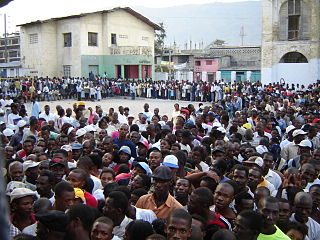
United Nations Security Council resolution 1007, adopted unanimously on 31 July 1995, after recalling resolutions 841 (1993), 861 (1993), 862 (1993), 867 (1993), 873 (1993), 875 (1993), 905 (1994), 917 (1994), 933 (1994), 940 (1994), 944 (1994), 948 (1994), 964 (1994) and 975 (1995), the Council discussed the election process and extended the mandate of the United Nations Mission in Haiti (UNMIH) for a further seven months.
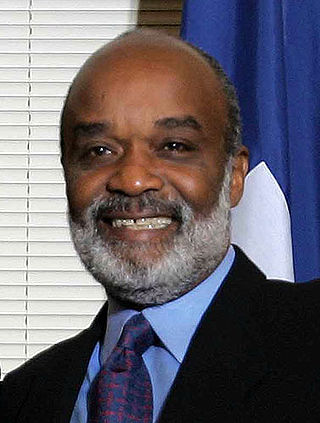
United Nations Security Council resolution 1048, adopted unanimously on 29 February 1996, after recalling resolutions 841 (1993), 861 (1993), 862 (1993), 867 (1993), 873 (1993), 875 (1993), 905 (1994), 917 (1994), 933 (1994), 940 (1994), 944 (1994), 948 (1994), 964 (1994), 975 (1995) and 1007 (1995) on Haiti, the Council extended the mandate of the United Nations Mission in Haiti (UNMIH) for four months until 30 June 1996, and reduced its size.
